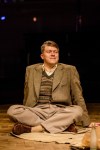Breaking the Code at Northampton’s Royal and Derngate and on tour – review
Based on Andrew Hodges’ book, Alan Turing, The Enigma, the production will also be staged in Barnstaple, Oxford, Peterborough, Liverpool and Manchester

The power of Breaking the Code, which premieres at Northampton’s Royal and Derngate, often lies in what is unseen. Much of the horror inflicted on Alan Turing is implied, yet its shadow pervades the stage.
This adaptation of Hugh Whitemore’s play is directed by the venue’s artistic director Jesse Jones, as part of the theatre’s Made in Northampton season. It tells the story of Turing, the mathematical genius who cracked the Enigma code in World War II, only to be later convicted for homosexuality. A new epilogue by Neil Bartlett bridges the gap between the play’s 1986 debut and today.
From the outset, the threat of hostility towards Turing is clear and Whitemore’s taut script fizzes with energetic dialogue. Police detective Mick Ross (Niall Costigan) treats Turing less as a witness than a suspect when he tries to simply report a burglary. Colleagues at Bletchley Park warn him that his sexuality and refusal to follow rules make others nervous and angry. His defence, “My passion lies in carrying out the work I’m doing,” falls on deaf ears.
Turing’s “crime” was simply being homosexual, still illegal in 1950s Britain. He was punished far more harshly than his lover, Ron Miller (Joe Usher), exposing the hypocrisy of the system. The trial and chemical castration are never shown, only spoken of, and although Turing makes light of it, the unfolding action tells a different story.
This stripped-back production lets the emotional drama speak for itself, pitting Turing’s brilliance against the oppressive forces of law, government, and convention. The pathos lies in seeing a man who gave so much to society so cruelly destroyed by it.

Mark Edel-Hunt delivers a charismatic performance as Turing – vulnerable, playful, and at times innocent. His stuttering honesty and passion for mathematics make his persecution all the more unbearable. His scenes with Dillwyn Knox (Peter Hamilton Dyer) beautifully convey both the joy of discovery and the pain of exclusion.
The chemistry between Edel-Hunt as Turing and Hamilton Dyer as Dillwyn Knox is palpable and the scenes in which Turing is first invited to Bletchley Park and later confronted with his refusal to “fit in” leave a lasting impression.
Alan’s relationships with his mother (Susie Trayling) and childhood friend (Joseph Edwards) are a joy to watch unfold. Edel-Hunt conveys a quiet resignation in the face of his mother’s nitpicking – the same quiet, resilient resignation he displays towards his trial. Did this trait in part contribute to his downfall?
The simplicity and starkness of the set design by Jonathan Fensom and effective lighting allow the complexity of human interactions to take centre stage. A few pieces of furniture and just a change in lighting shift the action dramatically from an interrogation room to the home, to a bar, to a bedroom in Greece. The action lies in the almost vignette quality of the scenes.
The second half of the play drives the intensity of the drama forward. Following the course of a Euripides tragedy, it reaches a standout moment in a scene set in Greece. Turing fixes his lover Nikos’ broken radio and then revels in his arms. It shows the moments where he was perhaps most happy, in the joy of his work, helping others, and in love – moments of freedom that were, heartbreakingly, never allowed to last. Edel-Hunt and Usher (as Nikos) create a lingeringly beautiful scene that stays in the mind’s eye.
The final image of Turing forces us to confront whether years of persecution simply became too much to bear. The final epilogue carries the full weight of emotion in a heartbreaking monologue delivered by Joseph Edwards as a sixth former, leaving the audience with a lingering sense of loss and injustice.
In his director’s notes, Jones hopes the play would raise questions about injustice. It does more than that: not only does it inspire questions, it exposes the tragedy and human cost of injustice within systems meant to protect.
Sharply relevant today, this production delivers a powerful and timely punch through superb storytelling and characterisation, which drive home the play’s message.















